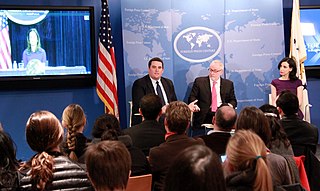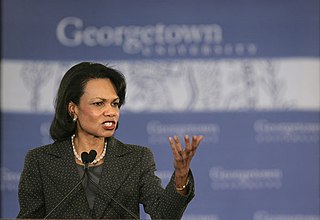
The United States Department of State (DOS), or simply the State Department, is an executive department of the U.S. federal government responsible for the country's foreign policy and relations. Equivalent to the ministry of foreign affairs of other nations, its primary duties are advising the U.S. president on international relations, administering diplomatic missions, negotiating international treaties and agreements, and representing the U.S. at the United Nations. The department is headquartered in the Harry S Truman Building, a few blocks from the White House, in the Foggy Bottom neighborhood of Washington, D.C.; "Foggy Bottom" is thus sometimes used as a metonym.

Nils Daniel Carl Bildt is a Swedish politician and diplomat who served as Prime Minister of Sweden from 1991 to 1994. He led the Moderate Party from 1986 to 1999, appearing at its lead candidate in four general elections, before his appointment as Minister for Foreign Affairs under Prime Minister Fredrik Reinfeldt from 2006 to 2014. Bildt first entered the Riksdag in 1979, holding a seat until 2001. A member of the Bildt family, he is a great-great grandson of Baron Gillis Bildt, who was Prime Minister of Sweden from 1888 to 1889.

The government agencies in Sweden are state-controlled organizations that act independently to carry out the policies of the Government of Sweden. The ministries are relatively small and merely policy-making organizations, allowed to monitor the agencies and preparing decision and policy papers for the government as a collective body to decide upon.

The Taipei Economic and Cultural Representative Office (TECRO), also known as Taipei Economic and Cultural Office (TECO), Taipei Representative Office (TRO) or Taipei Mission, is an alternative diplomatic institution serving as a de facto embassy or a consulate of the Republic of China to exercise the foreign affairs and consular services in specific countries which have established formal diplomatic relations with the People's Republic of China. The PRC denies the legitimacy of the ROC as a sovereign state and claims the ROC-controlled territories as an integral part of its territory. An exclusive mandate, namely One-China policy, requires that any country wishing to establish a diplomatic relationship with the PRC must first sever any formal relationship with the ROC. According to The Fletcher Forum of World Affairs, "non-recognition of the Taiwanese government is a prerequisite for conducting formal diplomatic relations with the PRC—in effect forcing other governments to choose between Beijing and Taipei." As a result, these countries only allow the ROC to establish representative offices instead of a fully-fledged embassy or consulate for the purpose of conducting practical bilateral relations without granting full diplomatic recognition.

Cultural diplomacy is a type of public diplomacy and soft power that includes the "exchange of ideas, information, art, language and other aspects of culture among nations and their peoples in order to foster mutual understanding". The purpose of cultural diplomacy is for the people of a foreign nation to develop an understanding of the nation's ideals and institutions in an effort to build broad support for economic and political objectives. In essence "cultural diplomacy reveals the soul of a nation", which in turn creates influence. Public diplomacy has played an important role in advancing national security objectives.

The Ministry for Foreign Affairs is a ministry in the Government of Sweden responsible for policies related to foreign policy, democracy, human rights, international development cooperation and foreign trade.
In diplomacy, an attaché is a person who is assigned to the diplomatic or administrative staff of a higher placed person or another service or agency. Although a loanword from French, in English the word is not modified according to gender.
The Estonian Institute is a non-governmental and non-profit organisation based in Tallinn aiming to promote Estonian culture abroad. The institute was founded in 1988/1989 as a shadow foreign office for the Estonian independence movement by Lennart Meri, later first foreign minister and first president of Estonia after their Soviet occupation. Current director of the institute is Katrin Maiste.

Digital diplomacy, also referred to as Digiplomacy and eDiplomacy, has been defined as the use of the Internet and new information communication technologies to help achieve diplomatic objectives. However, other definitions have also been proposed. The definition focuses on the interplay between internet and diplomacy, ranging from Internet driven-changes in the environment in which diplomacy is conducted to the emergence of new topics on diplomatic agendas such as cybersecurity, privacy and more, along with the use of internet tools to practice diplomacy.

The U.S. Department of State's Bureau of International Information Programs (IIP) supported the department's public diplomacy efforts by providing and supporting the places, content, and infrastructure needed for "sustained conversations" with foreign audiences. It was headed by the Coordinator for International Information Programs. IIP was one of three bureaus that reported to the Undersecretary for Public Diplomacy and Public Affairs. The Bureau of Educational and Cultural Affairs and the Bureau of Public Affairs were its sister bureaus. On May 28, 2019, IIP merged with the Bureau of Public Affairs into the Bureau of Global Public Affairs, and the duties of IIP Coordinator merged into the duties of the Assistant Secretary of State for Global Public Affairs.

The Ministry of Culture is a ministry within the government of Sweden responsible for culture policy. The ministry is headed by the Minister for Culture, currently Parisa Liljestrand (m).

Transformational Diplomacy is a diplomacy initiative championed by former United States secretary of state Condoleezza Rice for reinvigorating American Foreign Policy and the United States Foreign Service.
Swedish as a foreign language is studied by about 40,000 people worldwide at the university level and by over one million people on Duolingo. It is taught at over two hundred universities and colleges in 38 countries. Swedish is the Scandinavian language most studied abroad.

The Istituto Italiano di Cultura, the Italian Cultural Institute in English, is a worldwide non-profit organization created by the Italian government. It promotes Italian culture and is involved in the teaching of the Italian language. The creation of the institute was in response to the desire for a deeper understanding of Italian culture throughout many continents. By organising cultural activities it supports the work carried out by the Italian Embassies and Consulates. There are 85 Italian Cultural Institutes throughout major cities around the world.

A chancery is the principal office that houses a diplomatic mission or an embassy. This often includes the associated building and the site. The building can house one or several different nations' missions. The term derives from chancery or chancellery, the office of a chancellor. Some nations title the head of foreign affairs a chancellor, and 'chancery' eventually became a common referent to the main building of an embassy.

Cyber-diplomacy is the evolution of public diplomacy to include and use the new platforms of communication in the 21st century. As explained by Jan Melissen in The New Public Diplomacy: Soft Power in International Relations, cyber-diplomacy “links the impact of innovations in communication and information technology to diplomacy.” Cyber-diplomacy is also known as or is part of public diplomacy 2.0, Digital diplomacy, EDiplomacy, and virtual diplomacy. Cyber-diplomacy has as its underpinnings that, “it recognizes that new communication technologies offer new opportunities to interact with a wider public by adopting a network approach and making the most of an increasingly multicentric global, interdependent system.”
Rotation Curation, also #RotationCuration, is the concept of rotating the spokesperson on a broad scoped social media account. Such a scope can be a location, a country, an organization, a group, and so on. The concept is prominent on Twitter, but has also been ported to Instagram.
Curators of Sweden was a social media campaign initiated by the government agency Swedish Institute and VisitSweden on Twitter. It was launched on 10 December 2011 with the main concept of a rotating spokesperson, or rather a curator, on the official Twitter account of Sweden, @sweden. The account has been cited as popularising the concept of Rotation Curation.

Wolf warrior diplomacy is a form of public diplomacy involving compellence adopted by Chinese diplomats in the late 2010s. The term was coined from the title of the Chinese action film Wolf Warrior 2 (2017). This approach is in contrast to the prior diplomatic practices of Deng Xiaoping and Hu Jintao, which had emphasized the use of cooperative rhetoric and the avoidance of controversy.












